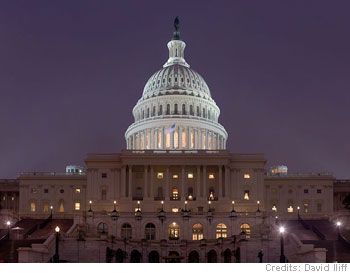 Just about everything you’ll hear coming out of Washington starting now is really about November’s mid-term election. The gravitational pull of the midterms was already apparent last year, as Republicans marched in perfect lockstep to vote against whatever the President and Dems proposed (Republicans always have authoritarian discipline on their side, which is why they’re Republicans) but you haven’t seen anything yet.
Just about everything you’ll hear coming out of Washington starting now is really about November’s mid-term election. The gravitational pull of the midterms was already apparent last year, as Republicans marched in perfect lockstep to vote against whatever the President and Dems proposed (Republicans always have authoritarian discipline on their side, which is why they’re Republicans) but you haven’t seen anything yet.
The Dems have enough votes to enact health care — the hurdle Bill Clinton failed to jump, contributing to the Republican takeover in 1994 — but when it’s enacted, expect the spin machines on both sides to be at full throttle. And because health care legislation won’t be implemented for another three or four years (depending whether the House or Senate versions prevail), Americans won’t be able to test the veracity of these wildly divergent claims. So don’t count on health reform to help Dems next November — nor harm them, either.
Foreign policy is just as unlikely to tip the scales. Sad to say, absent a draft most American families will read about American deaths in Afghanistan much the way they’ve absorb the U.S. body count in Iraq — as news items rather than personal tragedies. Nor will Iran’s nuclear capabilities, North Korea’s missile launches, Pakistan’s tumult, or Yemen’s terrorists have much electoral effect — unless terrorists commit an atrocity in America or on American travelers. Needless to say, China’s decision about whether and how much to revalue its currency, although important, will affect the votes of about three Americans (and I think I know all of them).
Issue Number One — the overriding concern that will determine more than anything how many seats the Dems lose next fall — is jobs. If unemployment is 10 percent or more next November, the Dems are in danger of losing the House and will almost certainly be short of the 60 votes they need in the Senate.
But why would employment be 10 percent or above next November? Surely, you say, there are enough signs of recovery that we can count on a lower rate. Don’t be so sure. Here are likely scenarios, with my probabilities:
Double-dip recession (10 percent likelihood). The commercial real estate market craters, carrying with it hundreds of regional banks and exposing how much junk is still on the books of major Wall Street banks. This triggers a long-awaited “correction” in the Dow and pushes the nation into another recession. Job losses rise. By November, the unemployment rate is back over 10 percent.
Stalled recovery (20 percent). Fearing inflation and overly confident of the strength of the recovery, the Fed stops buying up debt instruments and starts raising rates. These acts choke off the recovery. Unemployment remains at 10 percent.
Jobless recovery (40 percent). The stimulus remains in full force, the Fed keeps interest rates low, firms replace inventories and expand production. But with the average workweek hovering around 33 hours, employers don’t add new jobs; they just have current workers put in more hours. Result: No drop in unemployment.
Solid recovery (20 percent). Demand surges, employers decide to expand capacity. But they don’t add American jobs. Now that foreign workers have access to much of the same equipment and can be linked up to the U.S. so cheaply through the Internet, employers outsource abroad. Result: No drop in unemployment.
Strong recovery (10 percent). The recovery is strong enough for employers to start hiring American workers. Many jobless Americans who have been too discouraged to look for work to begin looking again. But because the BLS household survey (on which the official level of unemployment is based) depends on how many Americans are looking for work, the paradoxical result is for unemployment to remain in double digits.
In other words, I think the chances of unemployment being 10 percent next November are overwhelmingly high. But although voters are acutely sensitive to the rate of unemployment, they’re also influenced by the direction employment is heading. If it looks like jobs are coming back, they may forgive a high absolute level of unemployment — even one as high as 10 percent. But if it looks like jobs aren’t coming back, that we may be stuck with a high level of joblessness for years, voters will take out even more of their anxieties on Democrats next November.
The irony, of course, is that Republicans want to cut spending and reduce the deficit. If they had their way, we’d have double-digit unemployment as far as the eye can see.
- Bulenox: Get 45% to 91% OFF ... Use Discount Code: UNO
- Risk Our Money Not Yours | Get 50% to 90% OFF ... Use Discount Code: MMBVBKSM
Disclaimer: This page contains affiliate links. If you choose to make a purchase after clicking a link, we may receive a commission at no additional cost to you. Thank you for your support!



Leave a Reply